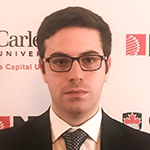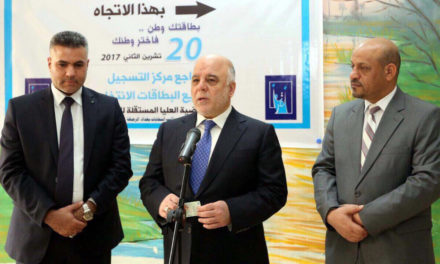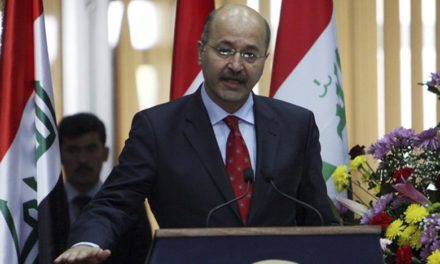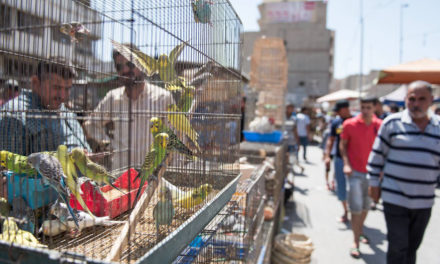Protests in Sulaymaniyah on December 18, 2017 (Feriq Fereç/Anadolu Agency)
In an article for Foreign Policy just before the Kurdish independence referendum, Bernard-Henry Lévy wrote that the Kurdistan Region of Iraq is, “a secular and democratic friend of the West with an elected parliament and free press.” When Lévy wrote these words, the Kurdistan Region’s parliament had been inactive for 2 years, and two months later the Kurdistan Regional Government (KRG) would be cracking down on protests and arresting opposition politicians, journalists and activists across the province of Sulaymaniyah. The suppression on freedom of speech and illegal arrests by the KRG has made it more difficult for the federal government of Iraq to revive relations with the KRG, forcing Prime Minister Haider Al-Abadi to look at other options.
For a long time, independent Kurdish activists complained about restrictions on freedom of speech in the Region and the excessive use of force against those who dare challenge the two dominant Kurdish parties, the Kurdistan Democratic Party (KDP) and the Patriotic Union of Kurdistan (PUK), with their calls being ignored. The dominant discourse was that of faux intellectuals such as Lévy singing praise of the KRG as an “oasis of freedom.” But this rhetoric proved to be misleading and detached from reality. Security forces loyal to the Kurdish parties have killed at least six protesters who were demanding the resignation of the KRG. The rallies began on December 18, 2017 when protesters attacked the headquarters of the Region’s political parties and a building of the security services in Sulaymaniyah. Protesters marched against government corruption, delayed salary payments and the authorities’ failure to provide basic services – all legitimate and defensible grievances.
This is not the first time the KRG has faced heated protests from disenfranchised citizens, there have been demonstrations against the government in 2011, 2015 and once again in late 2017 as the future looks grim for the Kurdistan Region. Kurdish citizens are looking to their Iraqi brethren outside the Region and despite facing the same economic crises from low oil prices and increased costs accumulated from the war effort, salaries of public servants continue to be paid while theirs have not. With payment of salaries being met and improved security throughout the rest of Iraq, Kurdish citizens are feeling more burdened with a semi-autonomous region led by two tribal dynasties instead of actual benefits to self-rule.
Kurdish citizens have reached their limit once again but this time Kurds are calling on Baghdad for support. During demonstrations, some Kurdish protestors called on Abadi for assistance and one Kurdish activist interviewed demanded that Abadi come to the Kurdistan Region to fix the problem, claiming “70% of the citizens in Kurdistan Region would welcome Abadi to fix their issues”. It is no coincidence that the change in the rest of Iraq and Abadi’s inclusive rhetoric towards all Iraqis has encouraged Kurds to request support from Baghdad. KRG failure to govern and provide for citizens with the millions from oil sales made independent of Baghdad’s provision has diminished the KRG’s credibility.
It seems that their desperate pursuit for freedom and their loathing for corruption and the corrupt unite Iraqi Kurds. Do not be surprised if one day all of Iraq is protesting at once whether in Basra, Baghdad, Sulaymaniyah or Erbil. Iraq is not homogeneous, but it is united in its demand for a better Iraq. Protests in Baghdad have already begun in retaliation to the KRG’s closing of NRT TV as Iraqis share a common belief in freedom of speech as the days of suppressed media under the previous Ba’athist regime remain in the back of their memory.
In 2015 Baghdad could be excused for not intervening in the Kurdish protests as the focus of the federal government was on the war against ISIS. However, now that the war is officially over, Abadi needs to respond to the demands of Iraqi citizens in the Kurdistan Region because the KRG is not responding other than by force and has lost all credibility as a result of recent protest crackdowns, media shutdown and kidnappings. Therefore, Abadi needs to empower opposition parties like Gorran who now hold the governorship of Sulaymaniyah. Bypassing the KRG by giving Sulaymaniyah’s share of the federal budget directly would empower the province of Sulaymaniyah and could assist the new governor to meet the demands of Kurdish citizens and would weaken the KDP and PUK’s grip over the Kurdistan Region, which could help halt KRG abuses. Citizens of Erbil and Duhok may also demand a more direct relationship with Baghdad if the one with Sulaymaniyah flourishes.
The direct payment from Baghdad towards provincial governments in the Kurdistan Region would strengthen the strategy the Abadi administration has already started by directly providing salaries to KRG ministries such as the Ministry of Water Resources. Baghdad is now auditing the Ministries of Education and Health. Kurdish activists are welcoming this strategy and it will strengthen Iraqi self-identification throughout the Kurdistan Region if direct payments of salaries and budgets are provided to all levels of government from Baghdad.

Hamzeh Hadad
Hamzeh Hadad is an Iraqi writer and commentator. He is currently a Master of Arts candidate at the Norman Paterson School of International Affairs.










